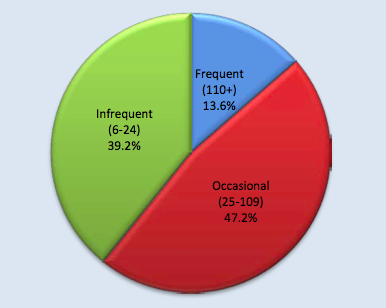
MOUNT PROSPECT, IL (BRAIN) — Cycling participation remained relatively flat in 2012, up a negligible 0.4 percent last year to 39.3 million, according to the latest numbers from the National Sporting Goods Association.
The NSGA released the 2013 edition of its Sports Participation reports Wednesday. More details and analysis on the NSGA participation figures is found in BRAIN’s upcoming July 1 issue, which contains the magazine’s annual compilation of industry statistics.
Of the 47 sports it tracked, 32 experienced growth last year. Indoor gaming activities increased by an average of 11 percent, while fitness sports each increased about 5 percent. Shooting sports were mixed but sports with firearms drove overall average increases to over 3 percent. Snow sports saw the steepest decline in 2012, dropping an average of 11 percent, the NSGA said.
Much of the growth seen was driven by women with 40 of the 47 sports having increased female participation, compared to only 11 showing increased male participation.
In cycling, the NSGA classifies participants as those who ride at least six times during the calendar year. Occasional riders (those who put in 25-109 days in the saddle) still make up the bulk of that 39.3 million figure—totaling 18.55 million last year or 47.2 percent followed by infrequent riders (6-24 days), who make up 15.41 million or 39.2 percent. Frequent riders (more than 110 days in the saddle) are only 5.35 million or 13.6 percent of the total.
The majority still skews male, with 20.2 million being men and 19.1 million female. But female participation in cycling is growing, up 4 percent last year.
Youth (riders ages 17 and younger) made up 28 percent or 10.8 million. Adults are the majority at 28.5 million or 72 percent of total riders.
More telling in the association’s findings is the big drop in ridership among kids ages 7 to 17 in 2012. Mountain bike participation, which the NSGA tracks separately, also declined 7.6 percent in 2012 to just under 5.5 million riders.
“While it’s important to recognize that one year does not make a trend, and there are many contributing factors for the increases and decreases in participation levels in every sport, we found some very interesting insights in this year’s research,” said Dustin Dobrin, director of research and information for the NSGA, in a statement. “Overall, participation in many sports is rebounding after some difficult years, while others continue to struggle in attracting new participants.”
The NSGA research includes state-by-state, lifecycle demographics, cross participation and single-sport reports. It also offers quick-view snapshots and 10-year trends on each sport.
For more information about the NSGA’s research, go to www.nsga.or/research.





